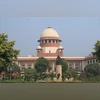The Supreme Court on Monday sought a response from the Ministry of Finance on a PIL highlighting critical vacancies in 11 Debt Recovery Tribunals (DRTs) across India.
The DRTs are set up under the Recovery of Dues to Banks and Financial Institutions Act of 1993 to enable banks and financial institutions recover bad debts from borrowers.
"Eleven DRTs remain unmanned which is creating issues. In view of the grant of additional charges and also the complications, notice be served including 'dasti', counter affidavits (reply) be filed in five weeks and the rejoinder to be filed within three weeks after the response," said a bench comprising Chief Justice Sanjiv Khanna and Justice Sanjay Kumar.
The PIL, filed by Ghaziabad resident Nischay Chaudhary, was argued by senior advocate K B Sounder Rajan along with lawyer Sudarshan Rajan.
According to the PIL, as of September 30, 2024, 11 DRTs are without presiding officers, severely impacting their ability to resolve cases efficiently.
The PIL raised concerns that nearly one-third of the 39 DRTs in the country are currently non-functional due to the absence of presiding officers, undermining their core objective of expediting debt recovery for banks and financial institutions.
More From This Section
The petitioner argues that this inaction frustrates the purpose of the 1993 law, which was enacted to ensure timely adjudication and recovery of debts.
The plea said various DRTs at Jaipur, Chennai, Mumbai, Aurabgabad, Ahmedabad, Coimbatore, Ranchi, Bengaluru and Lucknow have vacancies.
The PIL also emphasises that speedy justice is a fundamental right under Articles 14 and 21 of the Constitution, as recognised by the Supreme Court in the case of District Bar Association Dehradun vs Ishwar Shandilya in 2020.
The PIL sought a direction to the Ministry of Finance to produce records relating to the selection and appointment of presiding officers in DRTs to evaluate the government's seriousness in addressing these vacancies.
It also sought a direction to the Centre to mandate the timely filling up of existing vacancies and establish mechanisms to prevent delays in future appointments.
As interim measures, it sought a direction that the powers of non-functional DRTs are vested in other tribunals to prevent disruption of services.
"Issue any further orders to safeguard the efficient functioning of DRTs in the interest of justice," the PIL said.
"For instance, the Presiding Officer, DRT Patna has been given additional charge of the Ranchi DRT (22.07.2024) and Lucknow DRT (17.09.2024). The charge of DRT Jaipur has now been with DRT Delhi for almost a year.
"This stopgap arrangement is no respite; rather causes practical difficulties to the concerned lawyers practising in the particular DRTs and further decelerates the disposal of the other DRT as well," the plea said.
In view of the additional charge given to such DRTs, only urgent matters are taken up and normal matters are not considered, it said.
"The pendency is on the increase in such DRTs. The irony is that a specific time schedule ranging from 60 to 180 days has been stipulated in the Act whereas the DRTs remain non-functional due to non-appointment of Presiding Officers beyond the above time range," the PIL said.
(Only the headline and picture of this report may have been reworked by the Business Standard staff; the rest of the content is auto-generated from a syndicated feed.)

)